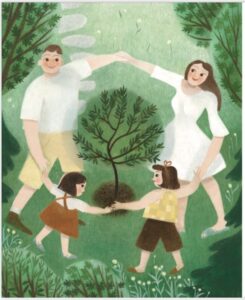Daily Life | Family | IBD | Relationships

Parenting presents many challenges as our children grow, one of which is navigating difficult discussions. If you’re a parent with chronic illness, your health is another topic of conversation that you will want to think about. Should you tell your kids about your health challenges? If so, when is the ideal time? How much detail should you provide, and should you ask your child to share their thoughts and feelings?
I know from personal experience that this can feel overwhelming, and I also know how important it is to initiate these family discussions.
I was diagnosed with ulcerative colitis in my late twenties, and as an otherwise healthy person, was resistant to the idea of medication. For the first year, I went dairy-free, sugar-free, soy-free, and gluten-free in hopes of healing myself through food, which meant searching for ingredients, and much trial and error with recipes. Unfortunately, the diet didn’t significantly improve my symptoms, so I eventually started a 5-ASA drug. Throughout those early years after diagnosis, I had many ups and downs, and tried various alternative treatments along with medication.
Early on in my journey with IBD I also attempted to start a family, which did not go smoothly due to the amount of inflammation in my body. It was a difficult time for me as I was learning to live with ulcerative colitis while also dealing with infertility. Eventually, I was fortunate to give birth to a baby girl and then another! While my children were little, I had various flares of IBD, IBS, and arthritis. In 2019 I had an IBD flare that left me hospitalized for ten days. My medication was no longer working, so as a last resort before surgery, we tried biologics. These days I’m taking a biologic medication that treats both my ulcerative colitis and ankylosing spondylitis (AS).

An illustration from Alison’s book, Kenzie’s Little Tree. In this illustration Kenzie mother tucks her into bed.
When I was in the hospital, my young children were at home with Dad and Grandma. My little one, not fully understanding the situation at age four, spent a lot of time playing in her room. My then seven-year-old understood more and had a better ability to articulate her feelings, but still had unanswered questions and worry.
As the hospital wasn’t close to home and my husband was juggling so much, our girls visited me only once during my absence. I missed them greatly, but it was incredibly distressing for them and for me when they did visit. I had an IV in my arm, was undernourished, and worst of all, could not return home with them afterwards.
Once I was back home, we didn’t talk about the hospital much. My husband and I thought that it would be best to try and forget about that time, and to focus on moving forward. However, the girls were quite upset for a while afterwards, worrying that I’d return to the hospital each time I went out or showed any sign of pain or discomfort. After meeting with a family therapist, we learned that repeated conversations about traumatic experiences can help children process their emotions. We then asked the girls what they remembered about my hospital visit, and over time had several discussions. Repeated conversations seemed to help with their healing, and we still occasionally recall that period and discuss details and feelings.

An illustration from Alison’s book, Kenzie’s Little Tree. Kenzie and her family dance around the tree Kenzie planted.
Learning about the importance of talking with kids about their experiences, worries, and pressures was one reason I wrote my debut picture book, Kenzie’s Little Tree, illustrated by Emilie Leduc. I hope that in reading this story, families will be inspired to start conversations of their own. Together with a psychologist, I have prepared discussion questions for families to accompany the book.
Another reason I wrote Kenzie’s Little Tree was to give kids like mine – who are affected by chronic illness or disability and the feelings that often accompany it – a chance to feel seen and represented in a picture book.
In Kenzie’s Little Tree, Kenzie and her family plant a fragile little tree in their yard one summer day, and she promises to keep it safe. Only when fall and winter weather flare along with Mom’s chronic illness, Kenzie worries that her promise will be broken.
A story of family, self-awareness, and resilience, Kenzie’s Little Tree reminds us that though the world is constantly changing, and oftentimes difficult, we can be bold and strong, just like the little tree.
Though family discussions around experiences, thoughts and feelings can be tough to navigate, I believe they are extremely important and beneficial for children. As each family and situation is unique, specifics around timing and details will vary, but reading a book like Kenzie’s Little Tree can be a great way to start these valuable discussions. If you need extra support with your family conversations, or there has been significant trauma, please consider consulting a professionally trained therapist.
Editor’s Note:
For more information on motherhood with chronic illness check out the Girls With Guts pregnancy and motherhood life stage page, which contains links to past blog containing more tips and stories about having conversations with children about IBD.
 Alison McGauley is a special education teacher and author who aims to create big-hearted books for little readers. As a person living with IBD and ankylosing spondylitis, Alison is passionate about writing stories that speak to children and caregivers who are impacted by illness or disability.
Alison McGauley is a special education teacher and author who aims to create big-hearted books for little readers. As a person living with IBD and ankylosing spondylitis, Alison is passionate about writing stories that speak to children and caregivers who are impacted by illness or disability.When she’s not teaching, reading, or writing, Alison adventures in local forests and trails with her family. She resides in Ontario, Canada, with her partner, two daughters, and Ragdoll cat.
Kenzie’s Little Tree (March 2025, Orca Book Publishers), illustrated by Emilie Leduc, is her first picture book. Check out Alison’s website for pre-order and fundraising details – https://www.alisonmcgauley.com/books/my-books!
